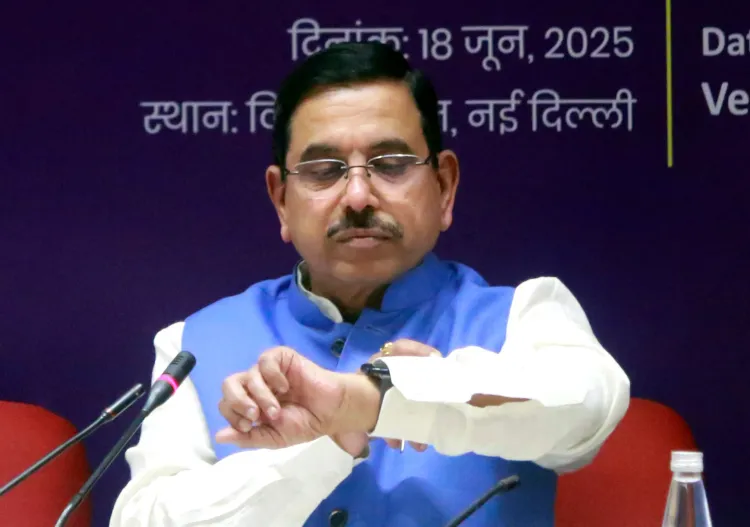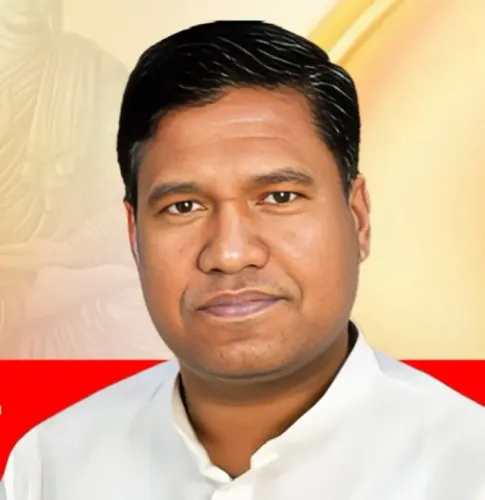Will 'One Nation, One Time' Under IST Enhance National Security and Accuracy?

Synopsis
Key Takeaways
- Synchronization with IST is legally mandated by 2025.
- The initiative enhances national security and accuracy.
- Five Regional Reference Standard Laboratories will be established.
- It promotes a secure digital ecosystem for all citizens.
- Public services will benefit from improved transparency and trust.
New Delhi, June 18 (NationPress) Union Minister for Consumer Affairs, Food and Public Distribution Pralhad Joshi emphasized that the forthcoming Legal Metrology (Indian Standard Time) Rules, 2025 will require the synchronization of all legal, commercial, and administrative functions with Indian Standard Time (IST), barring the use of alternative time references unless specifically authorized.
The minister pointed out the strategic importance of the Time Dissemination Project, which is being executed by the Department of Consumer Affairs in partnership with CSIR-NPL and ISRO.
During a Round Table Conference on Time Dissemination at Vigyan Bhawan, he stressed the necessity for accurate and uniform dissemination of IST across various sectors, including financial markets, power grids, telecommunications, and transportation, to guarantee fairness, accuracy, and national security.
This initiative aims to deliver IST with millisecond to microsecond accuracy via five Regional Reference Standard Laboratories (RRSLs) equipped with atomic clocks and secure synchronization protocols like NTP and PTP, marking a new phase of digital and administrative efficiency under the vision of ‘One Nation, One Time’.
For the general public, this initiative means more secure digital transactions, precise billing for utilities, reduced risks of cybercrime, and synchronized timekeeping in transportation and communication, promoting fairness, transparency, and trust in everyday services.
Nidhi Khare, Secretary of the Department of Consumer Affairs, in her presentation, emphasized the critical need for precise, secure, and legally mandated dissemination of IST to ensure uniformity across both strategic and non-strategic sectors.
She detailed that under the Time Dissemination Project, the Department, in collaboration with CSIR-NPL and ISRO, is setting up an advanced framework consisting of five Regional Reference Standard Laboratories (RRSLs) located in Ahmedabad, Bengaluru, Bhubaneswar, Faridabad, and Guwahati, which will be fitted with atomic clocks and secure synchronization systems utilizing Network Time Protocol (NTP) and Precision Time Protocol (PTP) for millisecond to microsecond accuracy.
The Secretary highlighted that the impending Legal Metrology (Indian Standard Time) Rules, 2025 will enforce synchronization of all legal, administrative, and commercial operations with IST, making India’s timekeeping infrastructure legally binding, digitally secure, and globally competitive.
Her presentation outlined the dangers associated with the current dependency on foreign time sources, which include cybersecurity risks such as spoofing and jamming. She asserted that the implementation of these regulations would be a vital step towards ensuring traceability, increasing operational reliability, and promoting national time sovereignty. This initiative is a significant move towards establishing a reliable and standardized digital ecosystem throughout the nation.
The Round Table Conference saw participation from over 100 stakeholders from diverse sectors, including senior officials from key government ministries and departments, public sector companies, banks, and business organizations.










